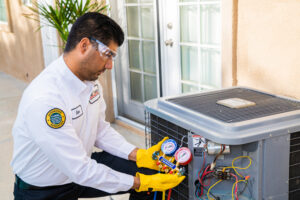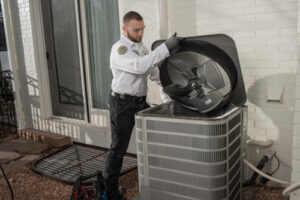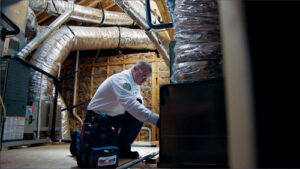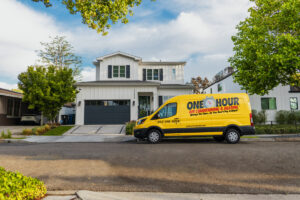Why Is My AC Blowing Hot Air? Find Out and Fix It Fast
Can we talk about how brutal these summer heatwaves have been lately?
I don’t know about you, but there’s nothing I look forward to more after a scorching day than walking through that front door and getting blasted with some sweet, crisp, air-conditioned relief.
Except when that doesn’t happen…because your AC has decided to go rogue and start blowing hot air instead! Ugh, the worst.
Understanding the Basics of Your AC
Your air conditioner should be your ally during those scorching days. Knowing how it works will help you understand why it might be blowing hot air. Essentially, your AC removes hot air from your house, cools it, and recirculates it. When things go awry, that cycle gets disrupted.
I know that sinking feeling all too well. You think you’re about to get a refreshing embrace from your trusty AC buddy, but nope – it’s like opening the door to a sauna. What gives?! Before you start sweating bullets and stripping down to your undies, let’s troubleshoot this thing.
Common Causes of an AC Blowing Hot Air
Several factors could be causing your AC to malfunction. Some of these issues are easy to fix, while others might require professional help.
Thermostat Settings
Sometimes the issue is something obvious that makes you want to smack yourself on the forehead. Like checking if your thermostat is accidentally set to HEAT mode instead of COOL. Or making sure that fan isn’t just running on “on” 24/7 blowing air whether it’s cold or not. Rookie mistake, but hey, it happens to the best of us!
Dirty Air Filters
Other times, it might be those poor air filters getting so caked with dust and bathroom hair tumbleweeds that there’s no way any air can squeeze through. Gross, but an easy fix! Slap in some fresh new filters every few months and your AC will breathe easily again.
Refrigerant Issues
Now where it gets a little trickier is if your AC is straight-up lacking coolant/refrigerant – kinda important for the whole “cooling” thing, ya know? Unless you’re an AC whisperer, low refrigerant levels or leaks are gonna require calling in a professional to properly diagnose and handle that refrigerant safely.
Outside Unit Problems
Your AC consists of two main parts – the indoor unit and the outdoor unit. If the outdoor unit isn’t working correctly, it can’t dissipate heat from your home.
Dirty Condenser Coils
The condenser coils in the outdoor unit release heat. If these coils are covered in dirt or debris, they can’t do their job effectively, leading to warm air inside your home. Cleaning the condenser coils can improve your AC’s performance.
Blocked Condenser Unit
The outdoor unit needs ample airflow to function correctly. Ensure there are no obstructions like plants, leaves, or debris around the unit. Giving it some breathing room might solve your AC blowing hot air problem.
Electrical Issues
Sometimes, the problem lies in the electrical components of your AC. Faulty wiring or a tripped breaker can disrupt the cooling process. If you’re comfortable with handling electrical panels, you can check for tripped breakers. Otherwise, it’s best to call in a professional.
Inside Unit Problems
Issues within the indoor unit may be the reason your AC is blowing hot air.
Evaporator Coil Issues
The evaporator coil absorbs heat from the air inside your home. If it’s frozen or dirty, it can’t do its job properly. A frozen coil usually indicates airflow problems or refrigerant issues. A professional can diagnose and fix this for you.
Blower Fan Problems
The blower fan circulates cooled air throughout your home. If it’s malfunctioning, you won’t get the cool air you need. Listen for unusual sounds – they could indicate a problem with the fan.
Ductwork Issues
Your ductwork plays a crucial role in distributing air throughout your home. If there are leaks or blockages, cool air might not reach your living spaces.
Leaky Ducts
Leaky ducts can cause cool air to escape before it reaches your room. This not only results in warm air but also higher energy bills. Sealing duct leaks can improve your AC’s efficiency.
Blocked Vents
Blocked or closed vents restrict airflow, making it harder for cool air to circulate. Ensure all vents in your home are open and unobstructed.
Improperly Sized Ducts
If your ducts are too small or incorrectly installed, they can’t handle the air volume your AC produces. This is a more complex issue that requires professional assessment and correction.
Maintenance Matters
Speaking of pros, there are tons of other potential snafus – electrical gremlins, issues with the indoor/outdoor unit, ductwork drama – where you’ll want an expert set of eyes on it. Trying to DIY those kinds of fixes could end up causing more harm than good.
Regular maintenance can prevent many issues that cause your AC to blow hot air. Scheduling annual check-ups with a qualified HVAC technician ensures your system runs smoothly and efficiently.
Routine Inspections
During routine inspections, technicians can identify and fix small problems before they become major issues. This proactive approach helps maintain your AC’s performance.
Cleaning Components
Regular cleaning of the AC components, including coils and filters, can significantly enhance its efficiency. Clean components mean better airflow and more effective cooling.
Checking Refrigerant Levels
A professional can check and top off your refrigerant levels during routine maintenance. This prevents cooling issues related to low refrigerant.
Conclusion
So next time your AC messes up your perfectly chilled vibe, go through the basic checks, but don’t be a hero if the issue seems complex. Put down the toolbox and call up a certified professional to get that cool airflow back on track. And maybe invest in a couple of good fans just in case…you know, to avoid any more sweaty meltdowns!
